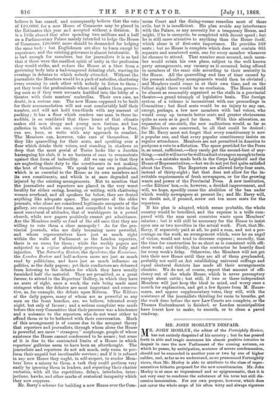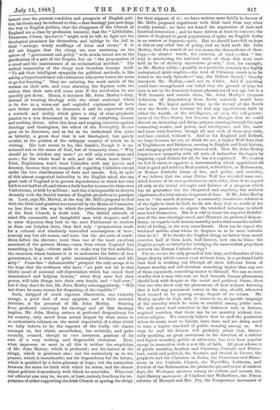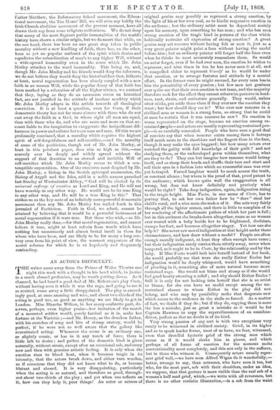MR. JOHN MORLEY'S DESPAIR.
MR. JOHN MORLEY, the editor of the Fortnightly Review, has not entirely despaired of his country ; but he has poured forth in able and tragic sentences his almost positive intention to despair in case the new Parliament of the coming autumn, on which he passes, by anticipation, sentence of severe condemnation, should not be succeeded in another year or two by one of higher calibre, and, as far as we understand, more pronounced Fortnightly views, than Mr. Morley is able to attribute to the class of repre- sentatives hitherto proposed for the new constituencies. Mr. John Morley is at once so impassioned and so epigrammatic, that it is not very easy to condense the substance of his terse but still dis- cursive lamentation. For our own purpose, however, which does not cover the whole scope of his often witty and always vigorous lament over the present condition and prospects of English poli- tics, his thesis may be reduced to this,—that theology just now stops the way in English politics, that the clergymen of the Church of England are a class by profession immoral, that the " Littledales, Thomsons, Closes, Spectators" might well be left to fight out the theological premisses for themselves, and indulge to the full in their " strange, windy scuftlings of kites and crows," if it did not happen that the clergy are now venturing on the sphere of " government and policy " with minds intent not on 'the pacification of a part of the Empire, but on " the propogation of a creed and the maintenance of an ecclesiastical accident." The radical immorality of the clergy now therefore betrays itself. "To ask their intelligent sympathy for political methods, is like asking a hypochondriacal valetudinarian who never leaves his room to go fox-hunting." They are enlisting the weak minds of the women on their side, and even alarming the Squires with the notion that their turn will come next if the revolution be not speedily put down. Hence, it becomes Mr. John Morley's duty, instead of treating theology with the silent contempt which is its due as a worn-out and exploded explanation of facts now better understood, to denounce it and its exponents with a warmth and ability which gives a ring of semi-prophetic passion to a woe denounced in the name of everything human and nothing divine. After this keen and rasping invective against theology and theologians, the editor of the Fortnightly Review goes on to denounce, and as far as we understand him quite as bitterly, a great deal that is not theological, but purely secular, in the politics of the unhappy country of which he is writing. His text seems to be, like Isaiah's, though it is an- nounced not in the name of God, but of humanity alone, " Why should ye be stricken any more ? ye will only revolt more and more ; for the whole head is sick, and the whole heart faint." First, Englishmen won't treat Catholics with any justice and decency, because they are incapable of regarding Catholics except under the two classifications of fools and rascals. Yet, in spite of this almost congenital imbecility in the English mind, the one great task of England is to govern dependencies in which her own faith is not held at all, and where a faith harder to conceive than even Catholicism, is held by millions ; and this it is impossible to do even decently with the fearful burden of English prejudices to paralyze us. Look, says Mr. Morley, at the way Mr. Mill's proposal to deal with the Irish land question was received by the House of Commons, no less than at the way in which the preliminary problem, that of the Irish Church, is dealt with. The British attitude of mind fills reasonable and thoughtful men with despair; and if in utter dejection they look to the next Parliament to retrieve us from our helpless state, they find only " preparations made for a colossal and absolutely unrivalled consumption of beer ; scarcely any but old names, and none but the old sorts of candi- dates before the electors ; more than one of the most excellent members of the present House,—men from whom England had something to hope,—thrust aside to make way for rich nobodies, the creatures whose business it is to undermine the fabric of free government, in a state of quite unexampled liveliness and hil- arity." From this " dishonourable" prospect the only escape is in the hope that the workmen who have " no part nor lot in that -idiotic mood of national self-depreciation which has seized their demoralized and helpless betters," when they once feel their power, will take things into their own hands, and " boil over ;" but if they don't do this, Mr. John Morley asks suggestively, " Will not there be some reason for despairing of the republic ?"
Such, stripped of much vigorous illustration, one violently savage, a good deal of neat epigram, and a little socialist
doctrine, is the jeremiad of Mr. John Morley. Starting from profound contempt for theology and all that theology implies, Mr. John Morley arrives at profound despondency for his country, only saved from actual despair by what seems to us enthusiastic reliance on the moral superiority of a class which we fully believe to be the superior of the really idle classes amongst us, but which, nevertheless, has certainly, and quite recently, evinced, though in rare instances, passions of its own of a very striking and disgraceful character. Now, what impresses us most in all this is neither the scepticism of Mr. John Morley, which is profound ; nor his hatred of the clergy, which is profound also; nor his melancholy as to the present, which is ineradicable; nor his despondency for the future, which is qualified by a faint glimmer of hope ; but the connection between the scorn for faith with which he starts, and the almost abject political despondency with which he concludes. Whatever our editorial sins may be, we are, at least, entirely free from the im- putation of either supporting the Irish Church or sparing the clergy for their support of it ; we have written more boldly in favour of Mr. Mill's proposed experiment with Irish land than any other weekly journal ; we have not feared the reputation of rash and fanatical innovation ; and we have striven at least to conceive the duties of England to great populations of quite un-English faiths in no narrow or dogmatic spirit. But we should have felt no hope in this or any other line of policy, had we held with Mr. John Morley, that the march of science means the discomfiture of theo- logy,—in simpler words, the exorcism of God ;—that " his- tory is uncovering the national roots of ideas that were once held to be of divinely mysterious growth," that, for example, as Mr. Morley oddly, —possibly in a positivist, certainly in a highly unhistorical spirit implies,—the root of Christian creeds is to be found in the early Synods,—" say, the Robber Synod," blandly interjects Mr. Morley,—and not in Christ. And if anything could have strengthened our belief that the ground of hope for man is not in the transient human phenomena of any age, but in a Will beneath and outside them, Mr. John Morley's eloquent deduction of despondency from doubt certainly would have done so. We hoped against hope in the victory of the North over the South, not because we had any superstitious faith in either the wealth, or the intelligence, or even the self-govern- ment of the Free States, but because we thought that we could discern an increasing and divine purpose running through the ages connecting wealth, and power, and intelligence, and life, more and more with freedom, though all and each of these may exist, and have existed, without it. And so for England and Ireland, we hope because we see, or think we sec, a higher Will than that of Englishmen and Irishmen, moving in English and Irish history, and bringing good out of long times of evil. llow Mr. John Morley hopes to sow sympathy with all sorts of unfamiliar theologies by inspiring equal disdain for all, he has not explained. We confess we feel it easier to approve a statesmanship which appreciates all that is good and noble in Brahminical, or Buddhist, or Mahometan, or Roman Catholic forms of law, and polity, and morality, if we believe that the same Divine Will has revealed some one- sided feature of its own perfection to each alike, than if we regard all only as the initial attempts and failures of a progress which has no guarantee but the chequered and anything but uniform experience of a very minute fragment of time. If Mr. John Morley sees in "the march of science a constantly cumulative refutation of the right to trust in God, we do not deny that no words of his can be too passionate to expose the wretched delusions to which men lend themselves. But it is odd to boast the superior fruitful- ness of the non-theologic creed, and illustrate its profound despon- dency, as regards both human morality and a statesmanlike cathol- licity of feeling, in the very same breath. How can he expect the wretched middle class whom lie despises so to be more catholic than he is ? If he thinks the English clergy no better than moral eunuchs, half of them fools, half knaves, how can he blame the English people so bitterly for indulging the same violent prejudices towards the Roman Catholic clergy ?
For us, we see the only ground of true hope, and therefore of that large charity which cannot exist without hope, in a profound faith that God is working out through all these different forms of human worship and self-devotion something higher than any one of them separately, something nearer to Himself. We can no more wonder that a man who sees no God beneath human phenomena should look with despair at the social and political future, than that one who knew only the phenomena of heat without knowing that it had any permanent source in the sun, should, whenever heat seemed to be passing away, despair of its return. Mr. Morley speaks in high and, it seems to us, no ignoble language of the morality which he seeks to establish among public men. We will never lead ourselves to the dishonest and, at bottom, sceptical assertion that there can be no morality without con- scious religion. We siucerely believe that he and the positivists whom he seems most to favour, have done and are doing much to raise a higher standard of public morality among us. But even he and his friends will probably admit that, histori- cally speaking, no great movement in the direction of a stricter and higher morality, public or otherwise, has ever been popular except in connection with a new life of faith. All great advances of public morality, heathen and Christian, Catholic and Protes- tant, social and political, the Socratic and Stoical in Greece, the prophetic and the Christian in Judea, the Franciscan and Domi- nican in the Catholic Church, the 1Vycliffite, Lutheran, and Puritan of the Reformation, the philanthropic and social of modern days, the Wesleyan missions among the colliers and miners, the Anti-Slavery movement of Clarkson and Wilberforce, the Prison reforms of Howard and Mrs. Fry, the Temperance movement of
Father Matthew, the Reformatory School movement, the Educa- tional movement, the Ten Hours' Bill, we will even say boldly the Irish Church abolition movement of the present moment, have all drawn their sap from some religious enthusiasm. We do not deny that many of the most flagrant public immoralities of the world's history have shown a similar origin, but we do assert that while, on the one hand, there has been no one great step taken in public morality without a new kindling of faith, there has, on the other, been as yet no popular outburst of the spirit which denies and repudiates the subordination of man's to any higher Will, without a wide-spread immorality even in the sense which Mr. John Morley attaches to the word immorality. This being so, and, though Mr. John Morley and his friends would deny the inference, we do not believe they would deny the historical fact that, hitherto at least, moral regeneration has been closely coupled with a new faith in an unseen Will, while the popular decay of that faith has been marked by a relaxation of all the higher virtues, we contend that they, laying as they do an enormous stress on historical fact, are not justified in the attitude of insolent mockhry which Mr. John Morley adopts in this article towards all theological conviction. It is at least a question, even for them, if their democratic theory has not far more chance with those who do not cast away the faith in a God, in whose sight all men are equal, than with those who do, and who are more and more on that ac- count liable to the temptation to exaggerate the insignificant dif- ferences in power and culture between man and man. Of this we are profoundly convinced, that a morality which requires the highest spirit of self-forgetfulness and self-sacrifice,—and the morality of some of the positivists, though not of Mr. John Morley, at least in this petulant paper, does aim as high as this,—can scarcely ever be deeply and widely spread without the support of that devotion to an eternal and invisible Will of self-sacrifice which Mr. John Morley seems to think a con- temptible superstition. One of the creatures most despised by Mr. John Morley, a bishop in the Scotch episcopal communion, the Bishop of Argyll and the Isles, said in a noble sermon preached last Sunday at Westminster Abbey, " God will be elected by the universal suffrage of creation as Lord and King, and He will not have worship in any other way. Ile would not be its true King in any other way, and He will be a true King in this." That strikes us as the key-note of an infinitely more powerful democratic movement than any Mr. John Morley has wailed forth in this jeremiad of Positivism. Faith in God, we admit, cannot be attained by believing that it would be a powerful instrument of moral regeneration if it were true. But those who wish,—as Mr. John Morley really does,—for that moral regeneration, and cannot believe it true, might at least refrain from words which have nothing but unmannerly and almost brutal insult in them for whose who have been, and are likely to be for many a long cen- tury even from his point of view, the warmest supporters of the moral reforms for which he is so hopelessly and desperately contending.
































 Previous page
Previous page